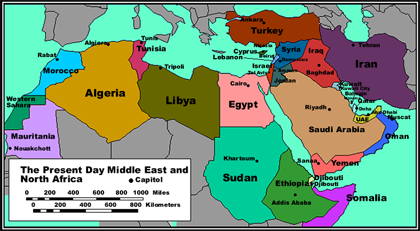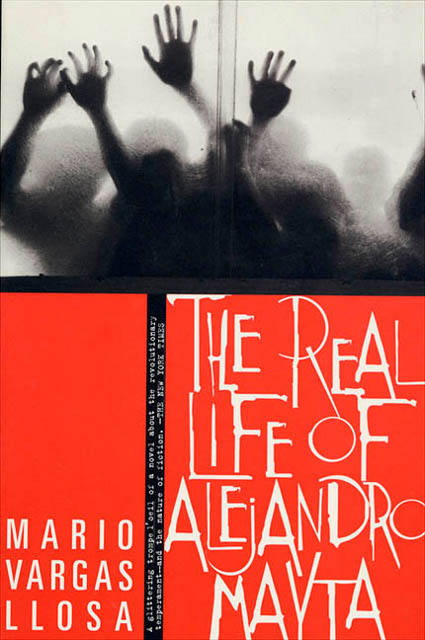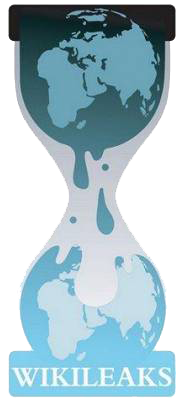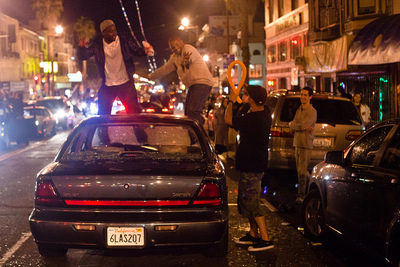
Middle East and North Africa: People's Just Struggles Lead to Cosmetic Changes Without Revolutionary Leadership
[Leaders] realize that the success of the struggle presupposes clear objectives, a definite methodology and above all the need for the mass of the people to realize that their unorganized efforts can only be a temporary dynamic. You can hold out for three days – maybe even for three months – on the strength of the admixture of sheer resentment contained in the mass of the people; but you won’t win a national war, you’ll never overthrow the terrible enemy machine, and you won’t change human beings if you forget to raise the standard of consciousness of the rank-and-file. Neither stubborn courage nor fine slogans are enough. - Frantz Fanon, Wretched of the Earth, p. 136, chap. 2, paragraph 57.

Starting in Tunisia on December 17, and spreading across the region in January and February, the people of north Africa and the Middle East are taking to the streets to fight brutal dictatorships in their respective countries. Taken by surprise by the force and longevity of these protest movements, the various imperialist-backed regimes are working hard to come up with changes that will pacify the people without fundamentally changing the system. These just struggles of the people are primarily targeting the figureheads in government, but the real problem lies in the system itself and at this stage we are only seeing some shuffling of the leadership.
Protests are sweeping across the region as the people are emboldened and inspired by the actions and results of those in neighboring countries, even moving further south into other parts of Africa. As this article is being written, there are reports of people’s uprisings in Bahrain, Libya, Iran, Yemen, Iraq, Kuwait, Algeria, Djibouti, Syria, Morocco and Jordan. In other parts of Africa, less visible in the media, popular revolts are also happening in Sudan, Gabon and Ethiopia.(1) Protesters are facing violent repression by the governments in most of these countries.
The response in the United $tates has been strong condemnation of Mubarak and other leaders targeted by protests (among those paying attention). Arabs may falsely look to Amerikans as friends in their current struggles. But where was this Amerikan “support” for the last thirty years as their country bank-rolled Mubarak with billions of dollars? In reality, their reaction is a sick reminder of what went down in Iraq. The same seething opposition to Mubarak was aimed at Saddam Hussein, resulting in the deaths of millions of Iraqis and the destruction of one of the most developed Arab countries. Iraq is just one example to demonstrate how Amerikan racism quickly lends itself to popular support for militarism, the savior of post-WWII U.$. global dominance.
Economics of the People’s Struggles
There are many differences between these mostly Arabic-speaking countries, but the one common enemy of the people there is the enemy of the people throughout the world: imperialism. Capitalism is a system that is defined by the ownership of the means of production (factories, farms, etc.) by the wealthy few who we call the bourgeoisie, and who exploit the majority of the people (the workers, also called the proletariat) to generate profit for the owners. Imperialism is the global stage of capitalism where the territories of the world have been divided up and exploited for profit. Under imperialism, the economy in each country no longer operates independently, and what happens in one country has repercussions around the world. Because of this global interdependence, events in the Middle East and north Africa are very significant to the Amerikan and European capitalists, and are related to events in the global economy.
The question of real change hinges on whether the exploited countries that are now mobilizing stay within the U.$.-dominated economic structure, or whether they look to each other and turn their back on the exploiter nations. While militarily and politically controlled by the United $tates, their economic relationship to imperialism is dominated by the European Union who was responsible for 50% of trade for countries in the southern Mediterranean region in 1998. A mere 3% of their trade was with each other that year.(2) In 2009, these percentages had not changed, despite the lofty promises of the Euro-Mediterranean Free Trade Area to develop trade between Arab countries.(3) Tunisia, where the first spark was lit, had 78% of its exports and 72% of its imports with the European Union. Compare these numbers to the ASEAN and MERCOSUR regional trade groups, also made up of predominately Third World countries, which had about 25% of their trade internally.(4)
The problem with Europe dominating trade in the region is based in the theories of “unequal exchange” that lead trade between imperialist and exploited countries to be inherently exploitative. Part of this is because the north African countries mostly produce agricultural goods and textiles, which they trade for manufactured goods from Europe. The former are more susceptible to manipulations in commodities markets that, of course, are controlled by the imperialist finance capitalists. The latter are priced high enough to pay European wages, resulting in a transfer of surplus value from the north African nations to the European workers.
In order to develop industries for the European market, these countries have been forced to accept Structural Adjustment Programs (SAPs) from the various world banking systems (World Bank, International Monetary Fund). This has further tied the governments to imperialist interests over the years, as SAPs have many strings attached. The loans themselves, which are larger in this region than for the average Third World country (5), serve to transfer vast amounts of wealth from the debtor nations to the lender nations in the form of interest payments.
Countries in the Middle East and north Africa generally have greater relative wealth compared with Third World countries in the rest of Africa, Asia and Latin America. As a result the people in these countries enjoy higher levels of education, better health and fewer people living in poverty.(see World Bank, World Health Organization and CIA statistics) General trends since WWII are a growing middle class with an emigrant population that expanded and benefited from European reconstruction up to the 1980s. Since then immigration restrictions have increased in the European countries, particularly connected to “security” concerns after 9/11. The north African countries relate to the European Union similar to how Mexico does to the United $tates, but Mexico remains more economically independent by comparison. These uprisings are certainly connected to the growing population and the shrinking job market with slower migration to the EU.
Locally, there are economic differences within the region that are important as well. Other than the stick of oppressive regimes, some governments in the region have been able to use their oil revenues as a carrot to slow proletarian unity. Even so, extreme international debt, increasing unemployment with decreasing migration opportunities and the overall levels of poverty indicate that these countries are part of the global proletariat.
The recent economic crisis demonstrates the tenuous hold the governments of the Middle East and north African countries had on their people. Because imperialism is a global system with money, raw material and consumer goods produced and exchanged on a global market, economic crises happen on a global scale. The economic crisis of the past few years has affected the economy of this region with rising cost of living and increased unemployment rates. In particular food prices have reached unprecedented highs in the past few months.(6) One might think this would help the large agricultural sectors in these countries. However, food prices affect the Third World disproportionately because of the portion of their income spent on food and the form their food is consumed in. On top of this, all of these countries have come to import much of their cereal staples as their economies have been structured to produce for European consumption.
Reliable economic statistics are difficult to find for this region. Estimates of unemployment in any country can range from under 10% up to 40% and even higher, and there is similar variability in estimates of the portion of the population living below the poverty level. But all agree that both unemployment and poverty have been on the rise in the past two years. We suspect this trend dates back further with the decrease in migration opportunities mentioned above.
In Egypt about two-thirds of the population is under age 30 and more than 85% of these youth are unemployed. About 40% of Egypt’s population lives on less than $2 a day.(7)
The middle class in these countries, who enjoy some economic advantages, are sliding further into poverty. This group is particularly large in Tunisia and Egypt compared to many other countries in the region.(8) In Egypt the middle class increased from 10% to 30% of the population in the second half of the 20th century, with half of those people being “upper” middle class.(9) This class has been closely linked to the rise of NGOs encouraged by the European-led Euro-Mediterranean Free Trade Area. They know that it is possible for them to have a better standard of living and enjoy more political freedom without a complete overthrow of the capitalist system. And so we saw many of the leaders and participants in the recent protests demand better conditions for themselves, but generally leave out the demands of the proletariat.
In fact, some middle class leaders, like Wael Ghonim (an Egyptian Google employee who was a vocal leader in the fight against Mubarak), are calling for striking workers to go back to work now that Mubarak has stepped down, effectively opposing the demands and struggles of the Egyptian proletariat. Without the leadership of the proletariat, who have never had significant benefits from imperialism, these protests end up representing middle class demands to shuffle the capitalist deck and put another imperialist-lackey government in place. The result might be a slight improvement in middle class conditions but the proletariat ends up right back where they started.
In Tunisia and Egypt, where the uprisings started, the leadership and many of the activists were from the educated middle class youth.(10) In Tunisia people were inspired to act after the suicide of Mohammed Bouazizi, an impoverished young vegetable street seller supporting an extended family of eight. He set himself on fire in a public place on December 17 after the police confiscated his produce because he would not pay a bribe. Like many youth in Tunisia, Bouazizi was unable to find a job after school. He completed the equivalent of Amerikan high school, but there are many Tunisian youth who graduate from college and are still unable to find work.
The relative calm in the heavy oil producing region that includes Saudi Arabia, UAE, Oman and Qatar underscores the key role of economics and class in these events. These countries enjoy a much higher economic level than the rest of the region, as a direct result of the consumerist First World’s dependence on their natural resources. Only Libya joins these countries in having a Gross National Income (GNI) per capita above $5000, while all others in the region are below that level.(11) That’s compared to a GNI in the U.$ of $46,730.(12)
One economic factor that has not made the news much and which does not seem to be a focus of the protesters so far, is the importing of foreign labor to do the worst jobs in the wealthy oil-producing countries. In the Gulf Cooperation Council (consisting of Saudi Arabia, Qatar and the UAE, Bahrain, Kuwait and the Sultanate of Oman) there are an estimated 10 million foreign workers and 3 million of their family members living in these countries.(13) This was used as a carrot to the proletariat who were losing opportunities to work in the European Union. Egypt in particular encouraged this emigration of workers.
Revolutions or Unrest?
To belittle the just struggles of people around the world, typical imperialist media is referring to the recent uprisings as “unrest,” as if the people just need to be calmed down to bring things back to normal. On the other side, many protesters and their supporters are calling these movements revolutions. For communists, the label “revolution” is used to describe movements fighting for fundamental change in the economic structure. In the world today, that means fighting to overthrow imperialism and for the establishment of socialism so that we can implement a system where the people control the means of production, taking that power and wealth out of the hands of just a few people.
The global system of imperialism puts the nations of the Middle East and north Africa on the side of the oppressed. These nations have comprador leaders running their governments, who get rich by working for imperialist masters. Yet these struggles are very focused on the governments in power in each country without making these broader connections. Until the people make a break with imperialist control, changes in local governments won’t lead to liberation of the people.
Further, we have heard much from both organizers and the press about social media (Twitter, Facebook, etc.) as a tool of the revolution. These tools are celebrated as a replacement for leadership. It is true that the internet is a useful tool for sharing information and organizing, and decentralization makes it harder to repress a movement. But the lack of ideological unity leads to the lowest common denominator, and very few real demands from the people. No doubt “Mubarak out” is not all the Egyptian people can rally around, but without centralized leadership it is hard for the people to come together to generate other demands.
Related to the use of social media, it is worth underscoring the value of information that came from Wikileaks to help galvanize the people to action in these countries; the corruption and opulence of the leaders described in cables leaked at the end of 2010 no doubt helped inspire the struggles.(14)
Egypt provides a good example of why we would not call these protest movements “revolutions.” The Egyptian people forced President Mubarak out of the country, but accepted his replacement with the Supreme Council of the Military - essentially one military dictatorship was replaced by another. One of the key members of this Council is Sueliman, the CIA point man in the country and head of the Egyptian general intelligence service. He ran secret prisons for the United $tates and persynally participated in the torturing of those prisoners.
Tunisia is also a good example of the lack of fundamental revolutionary change. Tunisia’s president of 23 years, Zine El Abidine Ben Ali, stepped down on January 14 and fled to Saudi Arabia. But members of Ben Ali’s corrupt party remained in positions of power throughout the government and protests continue.
In State and Revolution Lenin wrote that the revolution must set a goal “not of improving the state machine, but of smashing and destroying it.” The protests and peoples’ struggles in the Middle East and Africa reinforce the importance of this message as we see the sacrifice of life in so many countries resulting in only cosmetic changes in governments.
What is the United $tates interest?
The United $tates is the biggest imperialist power in the world today; it controls the largest number and most wealth-producing territories in the world. Just as the economic crises of imperialism affect the rest of the world, political uprisings around the world affect the United $tates. The capitalist corporations who have factories and investments in this region have a strong financial interest in stability and a government that will allow them to continue to exploit the resources and labor. And with capitalism’s constant need to expand, any shrinking of the imperialist sphere of influence will help trigger future crises faster.
The Amerikan military interest in this region relies on having some strong puppet governments as allies to defend the interests of Amerikan imperialism and hold off the independent aspirations of the regional capitalists. This includes managing the planet’s largest oil reserves, which is important for U.$. control of the European Union, and defending their #1 lackey - Israel.
Tunisia is a long-standing ally of the United $tates, cooperating with Amerikan “anti-terrorism” to maintain Amerikan imperialist power in the region. Other imperialist powers also have a strong interest in the dictatorships in Tunisia including France whose government shipped tear gas grenades to Tunis on January 12 to help Ben Ali fight the protesters.(15)
Bahrain is a close U.$. ally, home to the U.$. Navy’s Fifth Fleet.(16)
Egypt has been second only to Israel in the amount of U.$. aid it gets since 1979, at about $2 billion a year. The majority of this money, about $1.3 billion a year, goes to the Egyptian military.(17) Further, the United $tates trains the Egyptian military each year in combined military exercises and deployments of U.$. troops to Egypt.(18) So for Amerika, the Supreme Council of the Military taking power in Egypt is a perfectly acceptable “change.” To shore up the new regime and its relationship with the United $tates, Secretary of State Clinton announced on February 18 that the United $tates would give $150 million in aid to Egypt to help with economic problems and “ensure an orderly, democratic transition.” In exchange, the Council has already pledged to uphold the 1979 peace accords with Israel. Prior to 1979, much of the Arab world was engaged in long periods of wars with the settler state.
United $tates aid to countries in this region is centered around Israel. The countries closest geographically to Israel are the biggest recipients of Amerikan money, a good way to keep control of the area surrounding the biggest Amerikan ally. In addition to Egypt and Israel, Jordan ($843 million) and Lebanon ($238 million) received sizable economic and military aid packages in 2010.(19) Compared to these numbers, “aid” to the rest of the region is significantly smaller with notable recipients including Yemen ($67M), Morocco ($35M), Bahrain ($21M) and Tunisia ($19M). The United $tates gives “aid” in exchange for economic, military and political influence.
Is Wisconsin the Amerikan Tunisia?
The global economic crisis clearly affects imperialist countries like the United $tates just like it does other countries of the world, but we don’t see the people in this country rising up to take over Washington, DC and demanding a change in government. Like the Middle East, the youth of Amerika are having a harder time finding jobs after graduation from college. But unlike their counterparts in the Middle East, Amerikan youth and their families do not face starvation when this happens.
Some people are drawing comparisons between the widespread protests by labor unions in Wisconsin and the events in Tunisia and Egypt. These events do give us a good basis for comparison to underscore the differences between imperialist countries and the Third World. Amerikan wealth is so much greater than the rest of the world (U.$. GDP per capita = $46,436); even compared to oil-rich countries like Saudi Arabia (GDP = $24,200). GDP does not account for the distribution of wealth, but in the United $tates the median household income in 2008 was $52,029. This number is not inflated by the extreme wealth of a few individuals, it represents the middle point in income for households in this country.
On the surface, unemployment statistics for the United $tates appear similar to some numbers for countries in the Middle East and north Africa. In 2008, 13.2% of the population was unemployed in the United $tates based on the latest census data.(20) However, with income levels so much higher in Amerika, unemployment doesn’t mean an immediate plunge into poverty and starvation. For youth in this country, there is the safety net of moving back in with parents if there is no immediate post-college job.
Similarly, U.$. poverty statistics appear quite high, comparable to rates in the Middle East and north Africa, at 14.3% in 2009. But this poverty rate uses chauvinistic standards of poverty for Amerikans. The U.$. census bureau puts the poverty level of a single individual with no dependents at $11,161.(21) Much higher than the statistics that look at the portion of the population living at $2 or $1.25 per day (adjusted for differences in purchasing power). Wisconsin public teachers average salaries of about $48k per year.
The Leading Light Communist Organization produced some clear economic comparisons between Egypt and the U.$.: “The bottom 90% of income earners in Egypt make only half as much (roughly $5,000 USD annually) as the bottom 10% of income earners in the U.$. (roughly [$]10,000), per capita distribution. Depending on the figures used, an egalitarian distribution of the global social product is anywhere between $6,000 and $11,000 per capita annually. This does not even account for other inequalities between an exploiter country and an exploited country, such as infrastructure, housing, productive forces, quality and diversity of consumer goods, etc.”(22)
In the United $tates it is possible for the elite to enjoy their millionaire lifestyles while the majority of the workers are kept in relative luxury with salaries that exceed the value of their labor. This is possible because other countries, like those in the Middle East and Africa, are supplying the exploited workforce that generates profits to be brought home and shared with Amerikan workers. Even Amerikan workers who are unemployed and struggling to pay bills are not rallying for an end to the economic system of capitalism. They are just demanding more corporate taxes and less CEO bonuses. In other words they want a bigger piece of the imperialist pie: money that comes at the expense of the Third World workers. These same Amerikan workers rally behind their government in wars of aggression around the world, overwhelmingly supporting the fight against the Al-Qaeda boogeyman in Arab clothing.
Down with Amerikanism, Long Live Pan-Arabism
Whether in Madison or Cairo, signs implying that Wisconsin is the Tunisia of north Amerika are examples of what we call “false internationalism” on both sides of the divide between rich and poor nations. Combating false internationalism, which is inherent in any pro-Amerikanism in the Third World, is part of the fight against revisionism in general.
What no one can deny is the connection between the mass mobilizations across the Arab world. That this represents a reawakening of pan-Arabism is both clear and promising for the anti-imperialist struggle. Even non-Arab groups in north Africa that have felt marginalized will benefit from the greater internationalist consciousness and inherent anti-imperialism with an Arabic-speaking world united against First World exploitation and interference.
Of course, Palestine also stands to benefit from these movements. The colonial dominance of Palestine has long been a lightning rod issue for the Arab world, that only the U.$. puppet regimes (particularly in Egypt) have been able to repress.
Everyone wants to know what’s next. While the media can create hype about the “successful revolutions” in Tunisia and Egypt, this is just the beginning if there is to be any real change. Regional unity needs to lead to more economic cooperation and self-sufficiency and to unlink the economies of the Arab countries from U.$. and European imperialism. Without that, the wealth continues to flow out of the region to the First World.
As Frantz Fanon discussed extensively in writing about colonial Algeria, the spontaneous violence of the masses must be transformed into an organized, conscious, national violence to rid the colony of the colonizer. Unfortunately, his vision was not realized in the revolutionary upsurge that he lived through in north Africa and neo-colonialism became the rule across the continent. Today, the masses know that imperialism in Brown/Black face is no better. As fast as the protests spread, they must continue to spread to the masses of the Arab world before we will see an independent and self-determined people.














